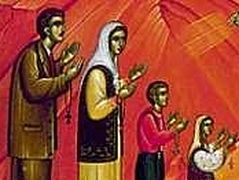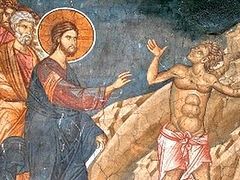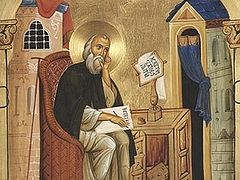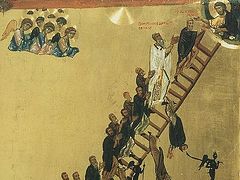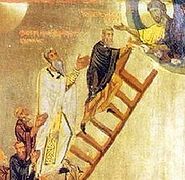In the name of the Father, the Son and the Holy Spirit. Amen.
Today, brothers and sisters, on this fourth Sunday of Great Lent, we remember Saint John Climacus who is known as Saint John of the Ladder. The icon of The Ladder of Divine Ascent in our church shows the monks that are climbing up towards Jesus Christ. It is a metaphor for our life and for how we must continually ascend, we must continually add virtue to virtue.

But where should we begin? The Lord gives us a place to begin. He says to us, “Blessed are the poor in spirit because theirs is the Kingdom of Heaven.” This is the beginning.
Pride destroys anything that is good. To be poor in spirit is to be humble, to recognize what is in yourself, to recognize how strong you are, that you are weak without Christ. It is to recognize that you are like the man who looks in the mirror but unlike the one in the scriptures, remembers when he leaves what he still looks like. It is to be the person who knows that he owed ten thousand talents and had it all forgiven. This is to be poor in spirit.
This is not a small step. It is the beginning, but it is a great step because it is in direct contradiction to the world. The world is full of pride, full of arrogance, blind and self-centered self-love. And unfortunately we should not be of the world, but we are, and so we are like that as well. We love ourselves more than others. We think of ourselves more highly than others. We continually put ourselves in advantageous positions. If you look at your life carefully, you will see that you’re far from being poor in spirit, and this is only the first rung. But to at least begin is a good thing.
So let us remember that we are the person who did owe the ten thousand talents. We are the person that was formerly far off in exile and has now been brought near to Christ, and by grace we have been saved through faith and that it is not of ourselves.
If we remember those things, then there will be opportunities in our life when we somehow by the grace of God and not of ourselves that we recognize the kind of person we are, and that recognition motivates us to do the right thing at the right time.
It is not possible to be good until we are humble. There are two things we need to know in order to be saved. We need to know about God, and we need to know about ourselves. We need to know the greatness of God and to know the littleness of ourselves. And if we see the difference between the two, then we will not think of ourselves so highly. But this is just the beginning. The Lord gives us, as it were, the ladder in the beatitudes. They ascend.
So you start with being humble. You start with recognizing in yourself that there is nothing good without God. It’s so easy for us to say this. We can quote the Scriptures about it, but do we really live it? If we live it, then we consider others more important than ourselves, then we consider that we are slaves of God and that we should do like we are told. To be humble encompasses all of the virtues.
Then also, it says that “blessed are they that mourn for they shall be comforted.” What is this?
 Repentance. Photo: Y.Kaver
Repentance. Photo: Y.Kaver
In order to truly be Christian, one should have mourning in our heart. Mourning for what? Mourning for the human condition, mourning for the fact that things are not as they should be. We see sadness. We see violence. We see disillusionment. We see depression. We see all these things in the world. They’re not as the world is supposed to be. That’s not what God intended for us. Isn’t this terribly sad? Shouldn’t we mourn this? And shouldn’t we have within ourselves the knowledge of who we are, and that should make us sad as well?
We should *not* have some sort of neurosis and always consider that there is nothing good about ourselves, since God lives within us. But isn’t it sad that so much is given to us and yet so little is done by us and that in the world how there is cacophony of evil? This is terrible. Every time that someone dies it’s a tragedy. It’s not what God intended. Every time that someone is proud, every time that someone is hurtful, every time that someone steals or lies, this was not as God intended. This is terribly sad. We should mourn this, and the first place to start is to mourn within yourself that you have been given so much and yet do so little.
Now, the world doesn’t understand this, and that’s why there is so much pop ideology about accepting ourselves. That’s why every sin there is, is accepted because we cannot understand as a society what it is to truly mourn that which is within us that is not good. We consider it to be neurotic. We say, oh, we don’t love ourselves then. The Christian loves himself because God loves him, but the Christian is realistic about the kind of person he is and wishes to become better. This is a very hard thing to learn because our society just continually hammers against it.
It’s very difficult to recognize in yourself the things that need improvement and not to fall into some sort of neurotic self loathing. It’s not what God has intended. We should just be like, say, the athlete who wishes to become faster and recognizes that he is not yet at the goal that he has given himself, so he works hard for that goal. Every day that he runs does he lament and say, oh, “woe is me; I’ll never be able to be fast enough?” Not if he is a great athlete. If he is a great athlete, he continually presses towards the mark and eventually he gains it.
It’s the same thing with Christianity. We must recognize that we are missing the mark and desire with all of our heart to have this mark. That really is also part of the -- one of the beatitudes ties into it: Blessed are those who hunger and thirst after righteousness for they shall be filled. You can’t hunger and thirst for something unless you’re hungry and thirsty, unless you recognize what is wrong. If we are to climb this ladder successfully, first we must humble ourselves. Next we must mourn our condition and mourn that of the human condition.
A Christian never thinks of just ourselves; it begins with understanding ourselves and understanding how God has been good to us, and then immediately translates into concern for everyone else. That’s why Jesus Christ spoke so often about loving our fellow man. If we say we love God and hate our brother, we are a liar and the truth is not within us, says Saint John.
So if we see within ourselves that which is lacking and we mourn it, then we should also see that other people also lack and we should mourn their lack, not to judge them but just to know that they are also part of the human condition which expresses itself in many different ways. Weaknesses that we have, other people don’t have. Strength that we have, other people have weaknesses. It matters not. It is from the same source. That is, our weakness of the human condition, and we should mourn this.
“Blessed are the meek for they shall inherit the earth.”
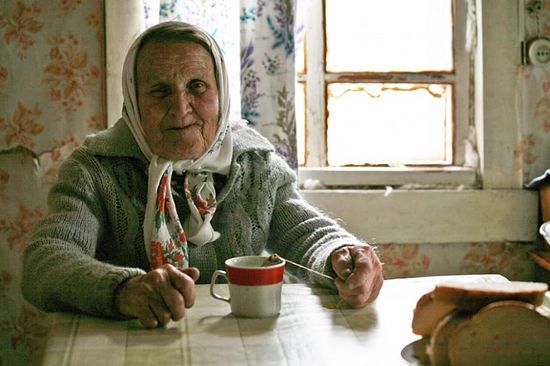 Photo: A.Kolosov
Photo: A.Kolosov
That’s a difficult thing. To be meek is to allow the will of God to occur in our life in everything. Do you see how it builds? How can you trust God unless you don’t trust yourself? To be poor in spirit is to not trust yourself. To be meek is to completely and totally trust God. You cannot trust God until you put aside your own esteem for your own opinions. And you cannot truly trust God until you mourn that which is lacking within you because God can give it.
Now, this is the one thing that I really wanted to talk about, that we can apply. It is very difficult for us to be humble. It is very difficult for us to really mourn all that we are and that we are not. But there is something that we can do. It is a virtue that is above humility. It is above mourning, and yet it also is reachable even if we have not yet become completely humble and completely mourn our condition.
We must be merciful. “Blessed are the merciful for they shall obtain mercy.” If you can live your life by some creed, live it by this one. Be merciful as our Lord was merciful.
What does it mean to be merciful? It means that we empathize with everyone’s condition. You cannot empathize with everyone’s condition until you’ve really understood your own. And we reach out to others whether it is through prayer or whether it is through some work or whether it is through some action, we’re merciful.
Just recently I saw something where at work there is a particular person who sort of is the scapegoat for all kinds of things. She often is kind of confused when she gets her reports, and she’s a little bit haphazard and sometimes even possibly a little bit lazy in some of the care she gives. And so people who consider themselves so great and high and mighty are constantly talking about her: “Can you believe what she did yesterday? Can you believe what she told me? She didn’t even know that this person had this operation”, and such. What kind of ugliness is this? It’s so easy to be merciful and just to not speak about it. Or to be merciful and to give a word of encouragement to this person who really feels kind of beaten on. And it’s true, she is beaten on.
To be merciful is to put yourself in her position. Now, perhaps she does some things that are not right. Being merciful doesn’t mean we pretend that something doesn’t exist. But to be merciful is to put yourself in her position. How does she feel?
To be merciful is to consider the feelings of others. We can do this. We can do this right now. And this ladder is not just where you ascend and you have to have one virtue before you have another; before you have the perfection of the next virtue in the ladder, you must have perfected the virtue below it. But we can in some extent, to some degree, participate in all of these virtues on the ladder. We can attempt to humble ourselves. We can mourn. We can be meek. We can be merciful. But I submit to you that it should be easy for us to not judge others and to be merciful to them if we just look at ourselves. And so this higher virtue also helps us to fulfill the lower ones. It’s a difficult task.
Look in your life. And see how often you are petty with someone, how often you judge them, how often you’re not kind to someone. And notice how you’re not kind to people that really can’t return anything to you or can’t hurt you in any way. I mean, you’re certainly kind to your boss, right? Or at least in his presence, right? But you don’t necessarily have to be kind in your own mind, shall we say, to someone who is not that important, like this nurse I told you about. She doesn’t have a very good reputation among the other nurses. So if a person wants to take a pot shot at someone, she is a likely target because she doesn’t have any credibility. What a sad thing to do though. Because then we are forgetting what we are like, forgetting that we are capable of the same mistakes she makes.
To be merciful is to be like God. It says that God is love, right? But what is love except to be merciful to others, to care about others, to empathize with others?
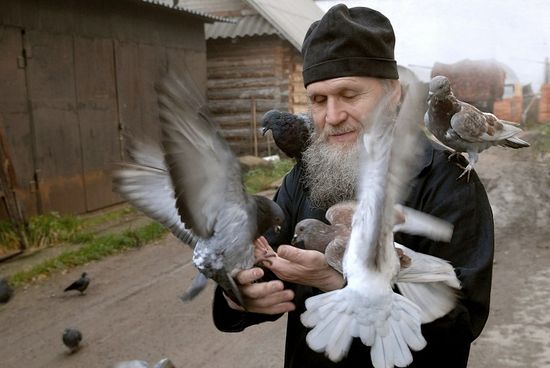 Monk Gerasimos Photo: Archbishop of Vologda and Veliky Ustiug Maximilian
Monk Gerasimos Photo: Archbishop of Vologda and Veliky Ustiug Maximilian
Christianity is quite simple; I’ve told you this many times. And Lent is quite simple. Oh, yes, there are complicated services, and we have to be concerned about what foods we eat or don’t eat, and many of us try to read more and try to pray more and try to do all sorts of things that are good for the soul.
In its essence, Lent is all about changing. It’s all about becoming better. And what better way is there to be changed than to be more merciful because, if we are more merciful, we are more like our God and Savior Jesus Christ.
Christianity is very simple. We complicate it because we want to complicate it. Because then we sort of have a smoke screen around us. It’s hard to be brutally honest with ourselves. Christianity is brutal honesty with ourselves and with others.
And Christianity is to become like Jesus Christ. What better way to attempt to be like Jesus Christ and attempt to be merciful as He was merciful. Look in your life. See how often, the way you live, what you say, what you do, how you treat people, is far from merciful. I mean, all of us have heard of the golden rule, right? Everyone knows it, even people that don’t believe in God. If we live according to this way of life, to treat others as we would wish to be treated, regardless of whether or not they in our mind are worthy of such treatment, then we will be fulfilling the Gospel, the law of God.
Make no mistake about it; Christianity is about fulfilling
the commandments, all of them. And this ladder
continues to stretch higher and higher. I haven’t
even mentioned all of the beatitudes. And the beatitudes
themselves are a distillation of the Old Testament law.
And they even are not complete. Because the only way to
really complete all of the virtues is to live the
Christian life fully. And the beatitudes only mention but
a few things, as it were the cornerstones, the main
things.
But as we grow in the Christian life we will see virtue
upon virtue that we didn’t know existed before.
May God help us during this Lent and all of our life to be merciful. I ask you, I beg of you, look in your life today and tomorrow and the next day. This week, see where you have not been merciful. If you look and you ask, you will find and you will be amazed how often you’re not merciful to others. You should be able to think of a dozen instances or more of times, places, people that you don’t care about enough.
Remember that if we do not judge, we won’t be judged. I have told you before, this is the easiest way to get into the Kingdom of God, is to not judge. But this not judging, which is really inherent in being merciful, is a middle ladder. It’s not a beginning ladder. So in order to not judge, you must humble yourself and you must really desire righteousness, and you must trust God.
So it is true, if you do not judge, you will be saved, but in order to not judge, you must encompass the other virtues as well. But I’ve said just a minute ago, these virtues, although they ascend, you can also have one that is higher help one that is lower. So let us be merciful to others, and God will be merciful to us. Amen.

